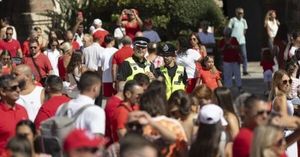In a dramatic turn of events that has gripped Turkey’s political landscape, the country’s main opposition party, the Republican People’s Party (CHP), is facing an unprecedented wave of arrests and allegations following the detention of two of Istanbul’s most prominent mayors. The developments, which unfolded over the past several months, have raised serious concerns about the state of democracy, the rule of law, and human rights in Turkey, with international organizations and domestic opposition figures sounding the alarm over what they describe as politically motivated crackdowns.
The saga began on March 19, 2025, when Turkish police launched a major operation targeting Ekrem İmamoğlu, the mayor of Istanbul and widely regarded as President Recep Tayyip Erdoğan’s strongest political rival. Just days later, on March 23, İmamoğlu was arrested, sparking the largest wave of protests Turkey has seen since 2013. According to reporting from multiple sources, including the Anka news agency and statements from United Nations special rapporteurs, nearly 2,000 people were detained during the demonstrations. This sweeping action included teenagers, students, lawyers, journalists, union leaders, and human rights defenders, with approximately 300 individuals formally arrested.
The demonstrations, which erupted in Istanbul and quickly spread nationwide, were met with a forceful police response. According to a letter dated June 19, 2025, from eight United Nations special rapporteurs—published following the Turkish government’s response in August—there were credible allegations of severe police violence. The rapporteurs warned that the reported acts "could amount to violations of the absolute prohibition of torture and other cruel, inhuman or degrading treatment or punishment." Their letter cited a disturbing pattern: protestors were allegedly subjected to beatings with batons, kicking, punching, the spraying of chemical agents directly at their eyes, and the firing of plastic capsules at their bodies. The use of high-pressure water cannons, known locally as “TOMA,” at dangerously close range was also documented.
In addition to physical violence, multiple reports highlighted injuries to the head and face, threats, insults, gender-based slurs, and even sexual violence against women. Detainees were said to have been denied adequate medical care, held for up to four days without access to lawyers, and faced restrictions on access to online information. The UN rapporteurs called on Turkish authorities to promptly investigate these allegations, release those arbitrarily detained, and ensure medical care for those in need.
The Turkish government, in its August 8, 2025, response, defended the police actions by invoking national security and public order laws. Officials declared the demonstrations "unlawful" on the grounds that organizers had not provided the required 48-hour advance notification, as stipulated by Article 10 of Law No. 2911 on Meetings and Demonstrations. While Article 34 of the Turkish Constitution guarantees the right to hold demonstrations without prior permission, critics—including a joint 2024 report by the Human Rights Association (İHD) and the Human Rights Foundation of Turkey (TİHV)—argue that the notification requirement effectively serves as a system of mandatory permission, undermining the right to peaceful assembly.
Despite government assurances that "allegations of violations committed by law enforcement officers are immediately brought to the attention of the relevant authorities and duly investigated," no information was provided regarding disciplinary or prosecutorial action against officers. The government also argued that tear gas and similar equipment are used in other countries, a statement that sidestepped concerns about excessive and dangerous use in violation of international standards.
As the dust from the March protests barely settled, another political earthquake struck Istanbul. On August 12, 2025, İnan Güney, the newly elected mayor of Beyoğlu—a historic and politically significant district at the heart of the city—was detained alongside 43 others as part of an investigation by the Istanbul Chief Public Prosecutor’s Office. By August 19, a Turkish court had ordered the arrest of Güney and 16 others on charges of fraud and membership in a criminal organization, with accusations ranging from running a criminal network for profit to bribery, fraud, and unlawful access to personal data.
The investigation reportedly centers on alleged connections to Murat Ongun, a senior adviser to the now-jailed İmamoğlu, and Emrah Bağdatlı, a media consultant currently at large. Prosecutors claim the suspects played roles in schemes targeting public institutions through various entities of the CHP-run Istanbul Metropolitan Municipality. After five days in custody and extensive questioning, 20 suspects were referred to court; 17, including Güney, were jailed pending trial, while 27 others were released under judicial supervision. The Interior Ministry quickly suspended Güney from his post, pending the outcome of his trial.
Güney, for his part, has forcefully denied the allegations. In his testimony, he stated, "The call records and financial reports allegedly cited in the referral [for arrest], as my lawyers also stated, were not presented to us either during the police or the prosecutor’s questioning. I believe that a decision made without allowing us to defend ourselves on matters we are unaware of would wound the public conscience."
The arrests have drawn swift and fierce condemnation from CHP leaders. Mahir Başarır, deputy parliamentary group chair, declared, "They have now arrested our Beyoğlu mayor, İnan Güney, with political revenge. Those who usurp the people’s will by using the judiciary as a tool will face the greatest reaction from the people. We stand firmly by all our friends under arrest." Özgür Çelik, the CHP’s Istanbul provincial chair, argued that it was not Güney who was being punished, but the people of Beyoğlu, noting the party’s recent electoral successes and its efforts to alleviate poverty. CHP Deputy Chairman Suat Özçağdaş described the arrests as "a clear revenge operation," stating, "It is not only a mayor who has been arrested, but the people’s will, democracy and the people-focused municipal governance proudly carried out in Beyoğlu."
Even outside Istanbul, the outrage resonated. Ankara Mayor Mansur Yavaş criticized the arrests, saying, "The rule should be trials without arrest, but here arrest has become the rule and release the exception," highlighting what he sees as a double standard in the application of justice to opposition mayors.
These events mark the ninth wave of operations targeting the Istanbul Metropolitan Municipality and its affiliates since the CHP’s resounding victory in the March 31, 2024, local elections. İmamoğlu, who remains in jail on corruption charges he vehemently denies, has called the prosecutions "a transparent attempt" to block his candidacy in the next presidential election. As the legal and political battles continue, the fate of Turkey’s opposition—and the country’s democratic institutions—hangs in the balance, watched closely by both domestic observers and the international community.
For now, the streets of Istanbul remain tense, and the voices of protest and dissent, though battered, continue to echo through Turkey’s corridors of power.




